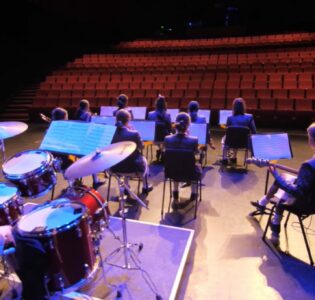Flow- the pure enjoyment of creating
JUDITH E PAPHAZY PHD., FACE
‘Flow’, now in its fourth year, is a regular part of classroom life at Grange Hill, Genazzano FCJ College’s Junior School. Readers may be aware that ‘Flow’ (Csikszentmihalyi, 1990) is a state that occurs when we’re so deeply engaged in an activity – e.g. playing music, reading a book, solving a puzzle, watching the stars – we become so absorbed, so focused that nothing else seems to matter. Time passes unnoticed and when we end the activity we feel satisfied and happy.
In our Grange Hill classrooms ‘Flow’ centres around active and meaningful engagement. We know from biology that our brains are initially interested in material with strong emotion content (Wolfe, 2001). We also know that our bodies consist of cells, with every cell possessing an emotional component (Shanor, 1999.; Le Doux, 2012). Thus, when our feelings are positive we pay greater attention, are more engaged and learning becomes more pleasurable.
So, now we invite you to come on a journey with us in Year 3. Imagine you are 8 or 9 years old and learning about ‘Identity’ as it could have applied in early Australia. Explore Captain Cook’s arrival: what did they see, how did they feel, what did they do? Then, learn about the Hulks in England and the need to move this overflow of people – result, settlement in Australia. And, what about the Aboriginal peoples? Well, Year 3 searched books, read stories, found pictures and videos as part of their preliminary research into these topics. They discovered all sorts of things; facts, stories and myths. Embedded in the topics were the clear goals (desired outcomes) which challenged the girls but were not beyond their skills and always with the appropriate feedback, whether from teacher or peers, to allow for adjustments necessary to enable success.
The girls first shared their research findings with each other, they discussed ways of recording their findings and then chose to work in groups. They devised their three dimensional interpretations of these ‘Identities’ via dioramas. They used twigs, leaves, grass and the more usual cardboard, icy-pole sticks etc combined with heaps of imagination to build their models. Their mental, physical and emotional involvement was palpable and all the while their teacher moved seamlessly between the groups offering appropriate feedback. The room was a hive of activity, yet the groups seemed oblivious of the others – the girls and their teacher were in ‘Flow’. The results and the delight evident on the girls’ faces (and their teacher’s too) were wonderful. he actual secret of ‘Flow ’at Grange Hill is that it makes the girls want to challenge themselves, it stretches them, it fires their curiosity thus their learning and doing becomes exciting.
* Note – students experienced some frustration in the Settlers activity, but all persisted and accomplished the task.
References:
Csikszentmihalyi, M. 1990. Flow: The Psychology of Optimal Experience. New York: Harper and Row.
Le Doux, J.E. Evolution of Human Emotion (in) Progress in Brain Research. Vol195, 2012
Shanor, K. 1999. The Emerging Mind. Los Angeles. Renaissance Books.
Wolfe, P. 2001. Brain Matters: Translating Research into Classroom Practice.Alexandria. VA.: ASCD




